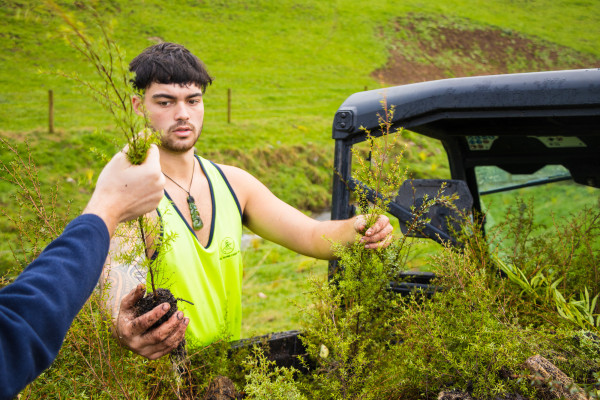Landowners retire nearly 6000ha of unproductive land in five years
| Published: | 13/10/2022 |
Landowners in the Waikato, with support by Waikato Regional Council, have in total retired the equivalent of 21 average-sized farms of unproductive land and planted over 3 million trees in the past five years.
The council’s Integrated Catchment Management directorate manages catchments in partnership with landowners to reduce soil erosion, flooding and the amount of sediment getting into waterways, and to improve water quality, river stability and river environments.
One way it does this is to help fund the costs of riparian and hill country fencing and planting.
This voluntary catchment and river restoration work is funded in different ways throughout the region, with funding coming from rates collected and/or by the council applying for funding for various work programmes from other organisations such as Waikato River Authority, the Ministry for the Environment, the Ministry for Primary Industries, the Ministry of Business, Innovation and Employment and the Waikato Catchment Ecological Enhancement Trust.
The amount of funding available to landowners depends on whether landowners live in an identified priority catchment or whether the council has secured additional funding for work programmes outside business as usual. It ranges from 35 per cent of costs to 100 per cent, depending on the type of work and funding available, and landowners are able to use their contribution as work in kind.
Waikato and West Coast Catchments Manager Grant Blackie says the council has financially assisted 1823 landowners in the past five years, with 80 per cent of the work funded undertaken in prioritised catchments.
“In the Waipā Zone, for example, we have catchments that are predominantly farmland and highly modified which deliver high loads of the sediment to the Waipa River, so we’ve had extra funding available for those landowners through Waikato River Authority, MPI’s Hill Country Erosion Fund and One Billion Trees,” says Mr Blackie.
“Landowners are doing a phenominal job taking care of their land and unfortunately we always have more landowners wanting to work with us than we have funding available and there are large areas of the region outside of our priority catchments where only very limited funding is available.
“In the past five years, with our help, landowners have retired 5777 hectares of land – remnant native bush, steep slopes, wetlands and riparian margins – which in total is the equivalent of about 21 average-sized farms in New Zealand. All of this work to retire unproductive land helps to contribute to cleaner water, increased biodiversity and improving the climate resilience of each farm.”
Catchment and river management work for the past five years has also included 1205 kilometres of fencing, to prevent stock access to retired land, and the planting of 3,147,324 plants, mainly native plants but also including smaller numbers of exotic afforestation species and poplar and willow poles.
“And that’s just through us. There are many landowners who fund this type of work alone or make their own applications for funding through other funding sources.”
Mr Blackie says the value of the work completed in the region in the past five years is conservatively estimated to be about $27 million, based on the average costs of fencing being $12 per metre and $4 for a tree in the ground.
The council has divided the region up into eight catchment management zones: Central Waikato, Coromandel, Lake Taupō, Upper Waikato, Waihou/Piako, Waipā and West Coast. A breakdown of the work completed in each of the zones during the 2017-2022 five year period is outlined in the following table.
|
Zone |
Fencing (km) |
Planting |
Retired land (ha) |
Number of properties |
|
Central Waikato |
79 |
269,381 |
165 |
113 |
|
Coromandel |
90 |
189,426 |
934 |
234 |
|
Lake Taupō/Upper Waikato |
75 |
240,913 |
253 |
236 |
|
Lower Waikato |
163 |
311,900 |
688 |
209 |
|
Waihou/Piako |
116 |
384,250 |
212 |
228 |
|
Waipā |
337 |
1,262,816 |
1477 |
485 |
|
West Coast |
345 |
488,638 |
2049 |
318 |
|
Total |
1205 |
3,147,324 |
5777 |
1823 |

Photo: Trey Newsome from Pūnui River Care works on the council’s two-year Clean Streams 2020 project, which was funded $1.998 million by MPI’s One Billion Trees project to enable landowners in priority catchments across the region, who permanently retire a stream, wetland or seep from grazing, have the retired area planted in native plants at no cost to them.


To ask for help or report a problem, contact us
Tell us how we can improve the information on this page. (optional)